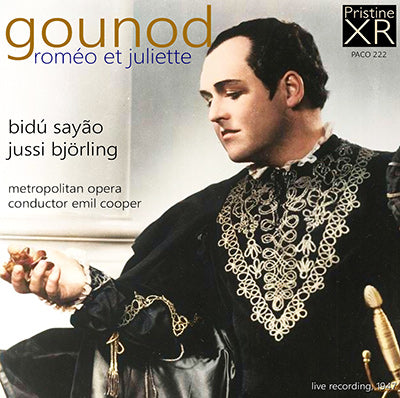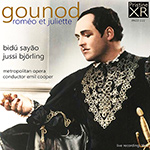
This album is included in the following sets:
This set contains the following albums:
- Producer's Note
- Full Track Listing
- Cover Art
Jussi Björling’s (1911-1960) association with Gounod’s Roméo et Juliette lasted more than twenty years. In September 1930 he recorded Roméo’s famous aria “Ah! Lève toi, soleil!” aged just 19. A year later he appeared in his first stage production of the opera in Stockholm, singing the part of Tybalt, graduating two years later to the title role, singing both roles in Swedish. After the war Björling re-learned the part in French and sang in the San Francisco Opera’s production between 1946 and 1951 and in two performances at the Metropolitan Opera in New York in early 1947. Fortunately, the second of his New York performances was broadcast nationwide and has become treasured by opera lovers as capturing an ideal cast in full command of their roles. Björling’s unique lyric-spinto tenor encapsulates the role like very few other singers. He is both youthful and ardent with all the power and brilliance needed to ring out over the ensemble, listen for example to the thrilling climax at the end of act three when he is exiled. Yet his duets with Juliette are both tender and sensitive, and Bidú Sayão recalled that in those moments Björling would ‘sing with extreme delicacy, never to cover my voice.’
Brazilian lyric-coloratura soprano Bidú Sayão (1903-1999) first sang Juliette at La Scala, Milan, in 1931 and it would become one of her best-known roles. Her light and delicate voice was ideally suited to a variety of roles in the regular repertoire, including Rosina, Susanna, Zerlina, Manon, Mimì, and Violetta. After becoming an established star in Europe in the 1930s, Sayão made her debut at the Metropolitan Opera in the Saturday Matinee broadcast of Manon in 1937 and would sing there until 1952. The radio audience got the opportunity to hear her in no less than 32 Saturday matinee broadcasts during her Met career, but only twice did they hear her as Juliette, in 1937 and this performance in 1947. Sayão had been a pupil of the famous Jean de Reszke and through him had a direct connection to Gounod, as de Reszke had sung Romeo with the composer conducting in the 1880s. Most would agree that Sayão is an exceptional Juliette. Paul Jackson in his Saturday Afternoons at the Old Met enthuses “Has there ever been a Juliette so delightfully virginal in her entrance roulades and waltz? The complete ingénue, yes, but with a bounding joie de vivre that makes her impetuous love entirely believable.”
The smaller roles are taken by a roster of singers, many of whom would have been very familiar to the radio audience. Nicola Moscona, singing Frère Laurent, and John Brownlee, singing Mercutio, both had twenty-year careers at the Met with the latter being a notable Count in Le Nozze di Figaro. George Cehanovsky, singing Pâris, surpassed them both with a forty-year Met career between 1926 and 1966. At the other extreme, Mimi Benzell, singing Stéphano, had just a five-year spell at the Met in her 20s, before her marriage in 1949.
Ukranian conductor, Emil Cooper (1877-1960) studied under the legendary Arthur Nikisch and conducted widely in Europe, holding positions with the Imperial Opera in Petrograd, and the State Philharmonic Society in Leningrad, before emigrating to the United States in 1924. In addition to his six-year stint as a staff conductor at the Met between 1944 and 1950, Cooper also led ensembles in Montréal and Baton Rouge.
In 1984 the Met released this performance on LP for members of the Metropolitan Opera Guild to purchase. Sayão fondly recalled the performance during the intermission of that year’s Fidelio broadcast. She said that working with Björling was “wonderful” simply because he was a “marvellous singer with a really beautiful voice.” And of all her Met broadcasts she was particularly delighted they had singled out that one. This release allows us to experience once again (in superb XR remastered sound!) the magic they made together.
Bonus Materials
These two selections bookend Björling’s association with the role of Romeo.
His recording of “Ah! Lève toi, soleil!” was the first operatic recording he
made for Swedish HMV in 1930. It gives us a rare glimpse of a Romeo whose
actual age was close to the age of the character he was playing. Twenty-one
years later Björling and Sayão appeared together on the Standard Hour live
from the stage of the War Memorial Opera House in San Francisco. Less than a
month later Björling would sing his last Romeo in Los Angeles. Even though
he was only 40 he never sang a note of the role again after 1951.
GOUNOD Roméo et Juliette
disc one (69:01)
1. RADIO Introduction (1:59)
2. Ouverture - Prologue - Vérone vit jadis deux familles rivales (6:35)
Act 1
3. L'heure s'envole (11:05)
4. Mab, la reine des mensonges (2:57)
5. Eh bien! Que l'avertissement me vienne de Mab (3:20)
6. Non! Je ne veux pas t'écouter plus longtemps (4:14)
7. Le nom de cette belle enfant? (0:25)
8. Ange adorable (4:47)
9. Quelqu'un! (5:54)
Act 2
10. Ô nuit! Sous tes ailes obscures (3:24)
11. L'amour, l'amour! (4:07)
12. Hélàs, moi, le haïr! (5:58)
13. Ô nuit divine! Je t'implore! (8:01)
Act 3
14. Mon père! Dieu vous garde! (6:15)
disc two (74:19)
1. Dieu qui fit l'homme à ton image! (5:19)
2. Depuis hier je cherche en vain mon maître! (3:40)
3. Ah! Ah! voici nos gens! (16:51)
Act 4
4. Va! Je t'ai pardonné (11:03)
5. Mon père! Tout m'accable (4:39)
6. Dieu! Quel frisson court dans mes veines (1:06)
Act 5
7. Entracte (2:01)
8. C'est la! Salut!...Ô ma femme! (5:12)
9. À toi, ma Juliette! (4:39)
10. Console-toi, pauvre âme (5:05)
CAST
Roméo - Jussi Björling
Juliette - Bidú Sayão
Gertrude - Claramae Turner
Frère Laurence - Nicola Moscona
Capulet - Kenneth Schon
Tybalt - Thomas Hayward
Le Prince - William Hargrave
Gregorio - Philip Kinsman
Mercutio - John Brownlee
Stéphano - Mimi Benzell
Pâris - George Cehanovsky
Benvolio - Anthony Marlowe
Metropolitan Opera Chorus and Orchestra
conducted by Emil Cooper
Live broadcast recording from the Metropolitan Opera House, New York, 1 February 1947
Bonus tracks from Roméo et Juliette:
11. Höj Dig, Du Klara Sol! (Ah! Lève-toi, Soleil!) (3:16)
Jussi Björling, tenor
Nils Grevillius and his Orchestra
Recorded in Stockholm, 29 September 1930
12. Va! Je t'ai pardonné (11:27)
Bidú Sayão, soprano
Jussi Björling, tenor
San Francisco Opera Orchestra
conducted by Gaetano Merola
Recorded 30 September 1951
War Memorial Opera House, San Francisco
Ambient Stereo XR remastering: Andrew RoseAmbient Stereo XR remastering: Andrew Rose
Cover artwork: Jussi Björling as Roméo
Total duration: 2hr 23:20

